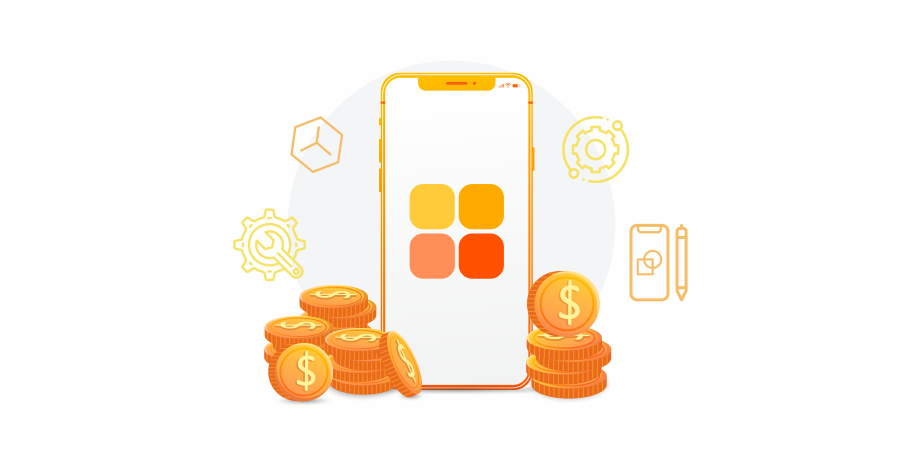Does your small business need a mobile app? To answer that question, next time you’re out and about, take a look around. We're consumed with mobile devices. People at bus stops, waiting in line at the grocery store, or on a lunch break - all likely looking at their mobile phones.
It’s clear that your business would have a mobile user base. So, it's an absolute that you need to explore mobile app development. We are a software development company and built many mobile apps. In this article, we want to answer all your questions. For example, “How much does it cost to make a mobile app?”, “What are the factors form the price of mobile app development?”, “Do the features influence the development cost?”. So, let’s get started.
Why Does Your Startup Need A Mobile App?
There are many reasons why startups should, or should not, build a mobile application. A mobile app should provide significant value to your users. Especially because they need a lot of time, money, and effort to develop. Nowadays, mobile-optimized web experiences can offer the same value as an application. So you have to be pretty confident that an app will bring added value to your business efforts.
Currently, over 3 billion people use smartphones on a daily basis and this number is forecast to grow to several hundred million in the next few years.
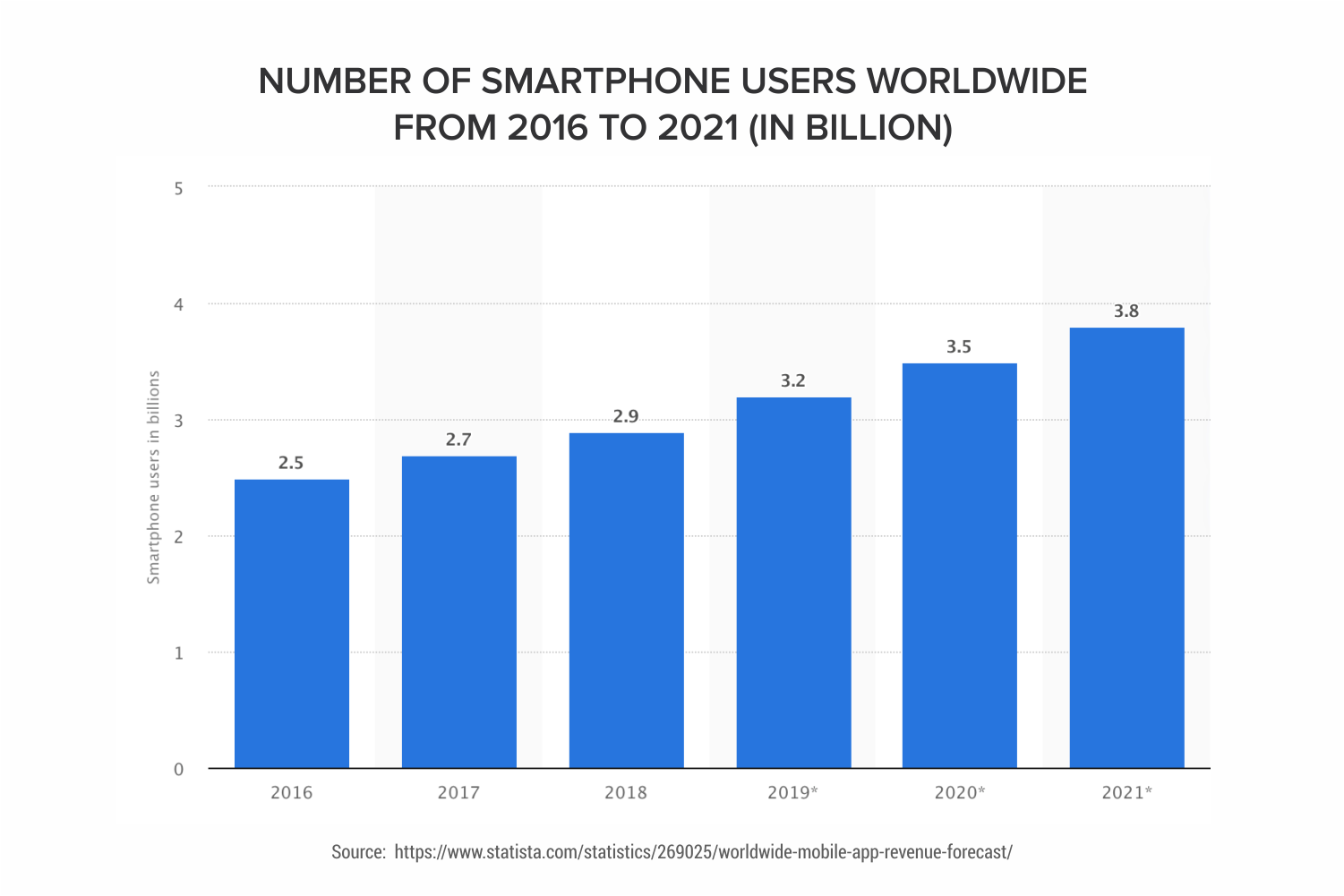
In the U.S. alone, over 95% of the population is using mobile devices. Around 77% use internet-equipped smartphones, and they're using them many times per day. Businesses are taking note and the trends state that a mobile strategy cannot be ignored. It’s for a reason, the most frequent search result in Google is “How much does it cost to build an app like Instagram / Facebook / Uber?”.
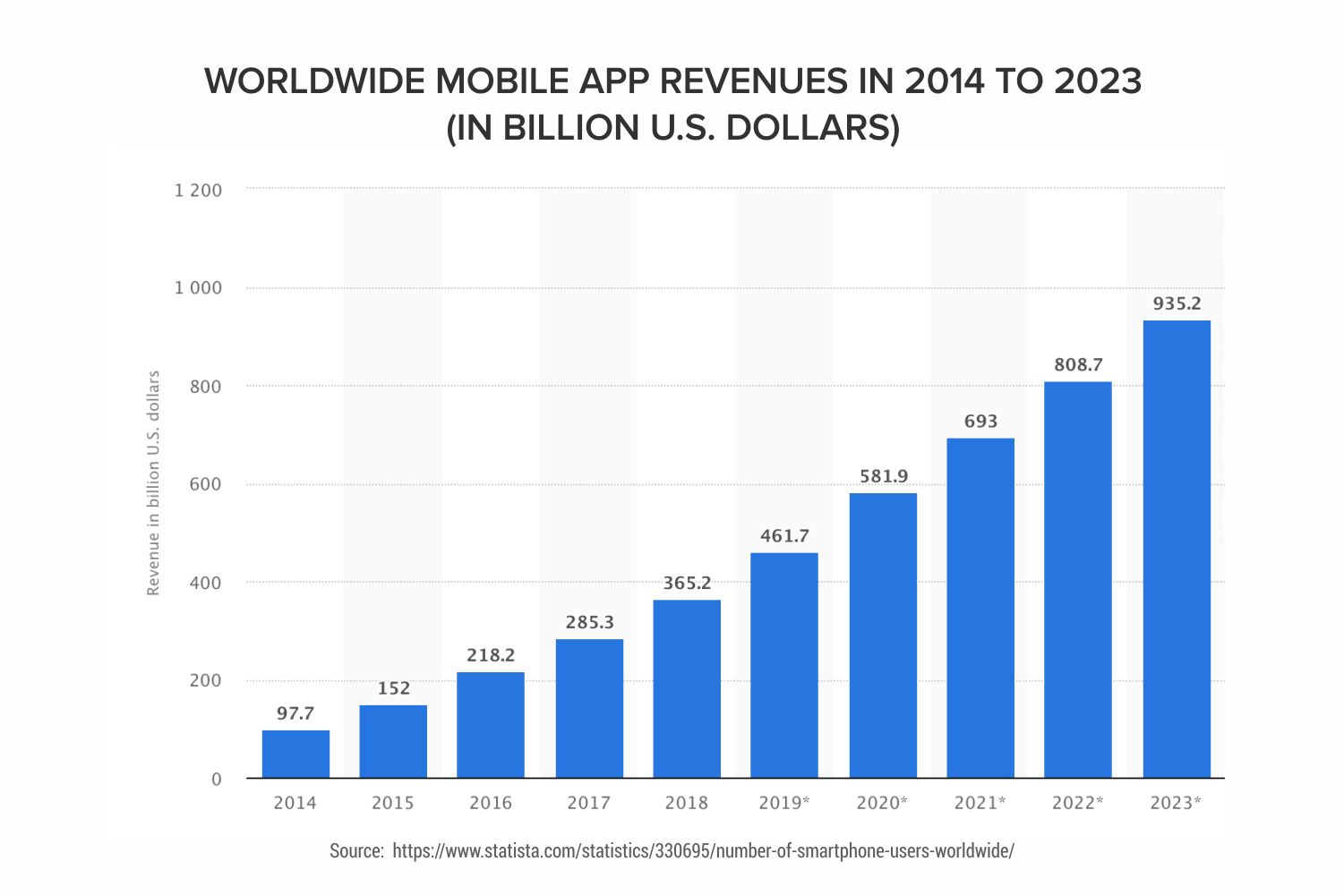
In 2019, global mobile app revenues made up over $460 billion, and it is supposed to be $580 billion at the end of 2020. By 2023, mobile apps would generate more than $935 billion in revenues via downloads and in-app advertising. That's an incredible increase.
Now apps do have several benefits for your business, like:
Improve brand awareness;
Boost sales of the product or a service;
Ease access to a business online;
Be in a trend of modern opportunities.
Mobile app businesses add more exposure in new markets by being listed in the Apple or Google marketplaces. They provide a new call to action (a download or install button) for the advertising. Plus, mobile apps are constant reminders to engage and interact with your brand. since they live on the device of the customers. The apps could relate to your business. And could be a supporting app with the goal to draw attention to the startup brand.
Once you decide to explore the mobile landscape, you need to decide what it is you're trying to do with your app. If your app is an extension of your business, then it has to have a more meaningful experience than your website. If it doesn't, there might not be a lot of value there.
The major brands took note of this rule and provided an opportunity to engage with their mobile devices. The apps like WhatsApp, Messenger, and Facebook were the top downloaded apps lately. While video stream app TikTok and Instagram took fourth and fifth positions.
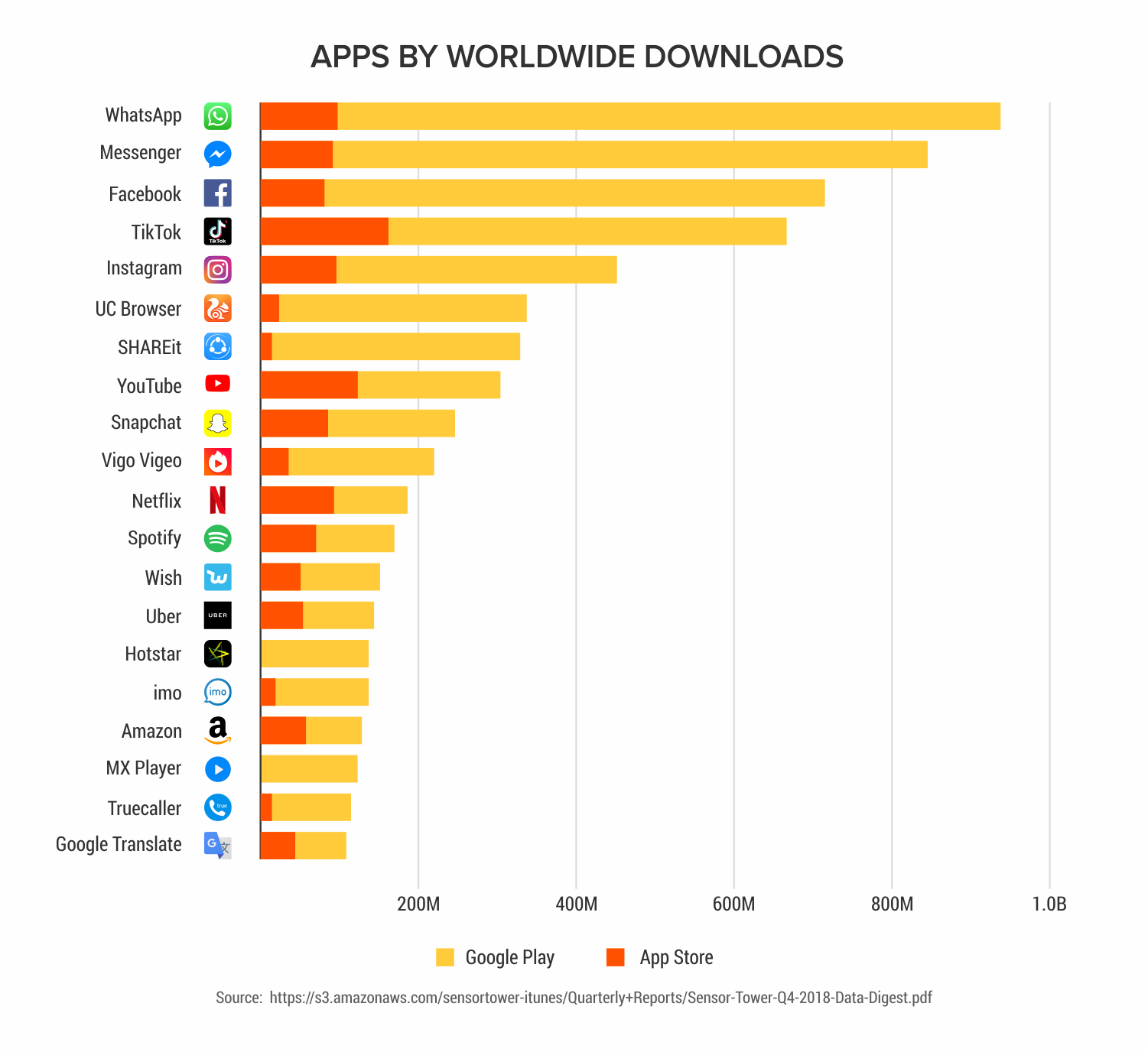
How can you ensure customer interaction with your mobile app? Learn from the best in the industry and take a look at what practices they used. This will inspire you to come up with individual ideas on how your customers will engage with a product. The major brands incorporate mobile app strategy into their business plan.
For example, companies like amazon.com have built mobile apps allowing us to scan barcodes to find the products cheaper on their website. While companies like Yelp have built-in reward-based systems for checking into local businesses.
What Factors Frame the Mobile App Cost?
Mobile applications need a lot of business planning. So, you need to have a clear understanding of the scope of your work. And allow you to calculate the approximate cost of mobile app development.
#1 Who is going to make your application?
You have several options here. For example, you can hire a development agency or freelance devs. While freelance devs might be more affordable to hire, still there might be some issues. You need to find every single specialist separately which could be more time- and money consuming. At the same time, the dev agency proposes the whole package of specialists. Starting from web developers and mobile app devs, UI/UX designers, project managers, and QA specialists. Hiring a dev team might be slightly expensive, but totally justified.
Additionally, you can choose outsourcing or local development. You can either hire a dev team from abroad (for example, from Eastern Europe) or leave your development to the local devs. Both options have their pros and cons, so you have to decide what is working best for you.
Local development suggests deep involvement while simplifying communication due to face-to-face meetings. Also, local development is more expensive because of professional qualifications. Outsourced development suggests a huge talent pool and a high level of candidate expertise. Moreover, lower rates and flexibility makes this way more appealing for clients. Hence, the lack of personal control and the time zone challenges could be considering the main cons of this type of development.
The process of choosing one or another will be basic in framing your app development budget. Pay attention to the average rate, skill level as well as portfolio/previous experiences.
#2 Technical Complexity
Technical complexity defines the number of features, data amount, time for development, etc. Speaking of the app types there could be a data-driven app, on-demand app, marketplace app, social networking app, or game app.
The type of app will influence the price. Whether you choose to develop a native app, hybrid app, or cross-platform mobile app development - the cost will be different.
Check out “How to Choose a Technology Stack for Mobile App Development”.
#3 Tech Requirements
The cost of building an app also depends on the clarity of technical requirements given by the client. Clear and accurate requirements are the guarantee project success. As a client, you should create a document, called a scope of work, and outline everything the application will need to do. Get really detailed about your vision of business ideas and design. Don't try to pack all your features at once. Instead, pick the must-have features and start with those.
The development process will start with a small prototype or a minimum viable product. From the very start, all tech requirements should be negotiated between the dev team and the client. If the task is set in a vague way, the process of development would take much more time for planning and redoing some tasks.
#4 App Load
Application load deals with data optimization and affects the final mobile app cost. Solving complex problems with the app suggests using complex software architecture. To make an app performance smooth, devs would use high optimization standards. So, the number of working hours will increase which will directly affect the cost of app development.
#5 Server Solutions
Complex apps usually operate with a huge amount of data and information processing. In this case, the right backend servers help to build a fast and robust application capable of operating a huge amount of data and perform all features smoothly. Such manipulations will require extra specialists and costs since the backend deals with several programming languages.
#6 Payment Gateway
Depending on your product or service, the application may have an in-build purchase option. Currently, Android/iOS users benefit a lot from payment software like PayPal, Apple Pay, Google Pay.
#7 Proper Support
A successful app development suggests that the product will fit any device. The limitation of app compatibility with certain devices will negatively affect your target audience and their loyalty to your product.
Designing iOS applications, one should be sure about it supporting the latest iPhone device and its predecessor to provide perfect compatibility. Android-powered devices require more attention, so developers consider not only the latest software/device versions but all operating systems starting from Android 5 (Lollipop). Web-app should support the top browsers like Google Chrome, Safari, Mozilla Firefox, and Microsoft Edge.
#8 UI/UX Customization
Mobile app cost depends on the level of design customization. It includes unique UI/UX solutions and/or animation complexity. The more custom elements will need a higher price of design and development. In fact, the design customization level is related to the app type.
The mention points are only a part of the price formation for the mobile app. You should also include extra expenses, hosting services, users’ support, and marketing services for the promotion of your product. These elements do not influence performance, though they are vital while attracting/retaining the target audience. Post-release support is usually excluded from primarily cost estimates. The company offers it as an additional service.
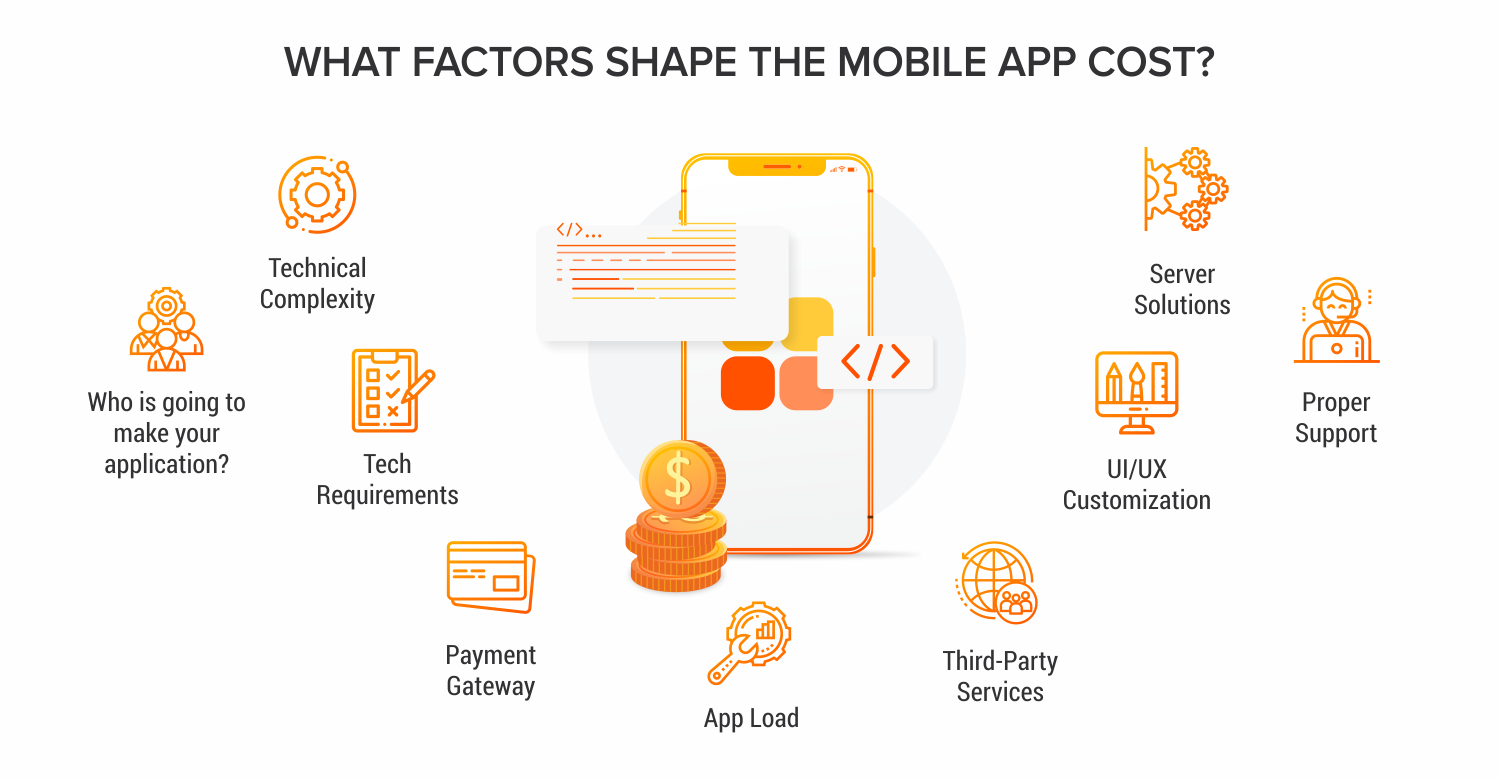
Does the Cost to Create an App Differentiate Worldwide?
Yes, it does. Depending on the region, team composition and the level of professionalism you should expect different rates on the mobile development. The first factor that you need to take into account while thinking about the cost of development is the hourly fees in different regions. For example:
North America (the US and Canada). It is the most expensive region, so the cost of a mobile app will be from $20 to $250 per hour.
In Australia, to develop a mobile app will cost from $35 to 150 per hour.
South American regional app development service rates are from $25 to $120.
UK developers tend to charge from $35 to $175 an hour.
Eastern European developers' rates start from $20 up to $110 per hour.
Developers in India charge $10-75 per hour.
How the App’s Complexity Influences Mobile Application Development Cost?
Basic Level: An app is considered a simple one if it has basic features. It does not need highly customized solutions and integration of third-party services or backend servers. Such apps do not process big data amounts and are aimed at building a user-friendly interface.
Medium Level: Middle complex apps have a wider range of implemented features. It includes customized UI/UX elements, real-time messaging system, payment management, third-party API integration, simple backend solutions.
High Level: Complex apps provide a full feature set accompanied by completely custom UI/UX solutions. Audio and video content processing, third-party service integration, animation elements, the synchronization feature, the backend having relations to diverse databases, etc. are the main components of the highly complex mobile apps.
How to Calculate the Mobile App Cost?
You can use the mobile app cost calculator, but depending on different reasons it might be difficult. Our team includes a simple equation to show you how you can calculate a mobile app development cost:
Total Development Time x Hourly Rates = App Cost
Based on your scope of work, the complexity of the app, and your developer's rate you can easily assume the cost of the mobile app development.
To do things right, you should create a detailed description of your app. It should include the basic features you want to include and where you see your product in 5 years. Then hire a freelancer or an offshore software company and discuss all the aspects of your product. Together, you can come up with the precise business and tech requirements for the new product development. From this point, it will be clear whether the app will have basic, medium or high levels of complexity. Sum app all the elements of the equation and get ready for the beginning of the development process.
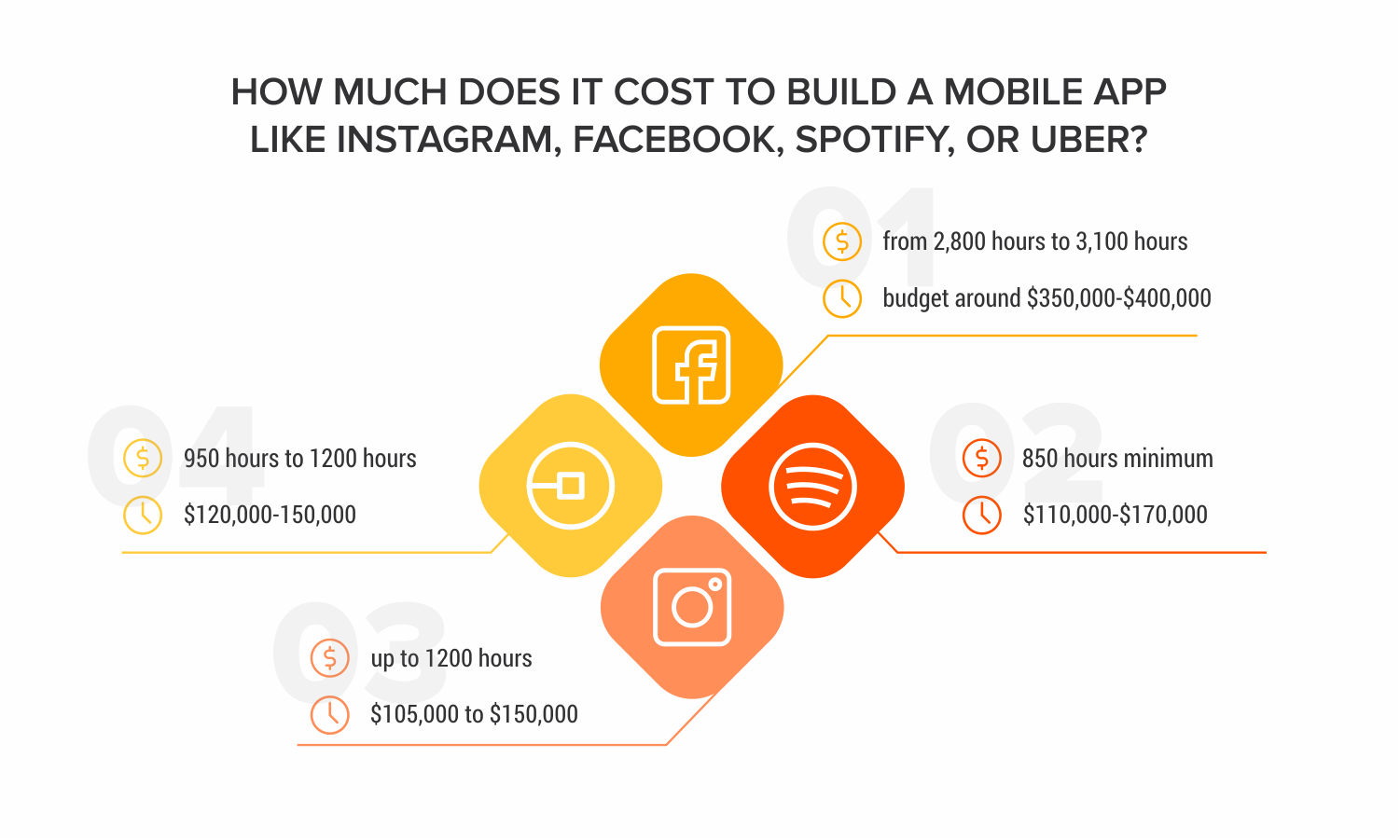
How Much Does It Cost to Build a Mobile App Like Instagram, Facebook, Spotify, or Uber?
To have a clear understanding of the mobile app cost, you can take a look at the top brands on the market.
Facebook. To build a social media platform like Facebook would take a lot of time, due to its diverse features. It is hard to calculate the cost of app development due to the many features that were developed over time. Such as real-time private and group chats, newsfeed, video calls, etc.. The approximate estimation of the time spent on development is from 2,800 hours to 3,100 hours, which makes up a budget of around $350,000-$400,000.
Instagram. Since it’s a more image-oriented social media platform, the visual components should be on the high-level. The app focuses on custom user experience and includes such features as advanced profile customization, geolocation, extend search system, tagging opportunity, smooth image load, and wide photo editing tools. Such an app will take over 1200 hours of development time, while the final cost may be from $105,000 to $150,000.
Spotify. The music streaming service focuses on audio content manipulations. Except for an advanced search system, artist/album extended database, preference, and suggestion engines, the business owner should consider additional costs (like the cost for music licensing and music hosting, advertising, etc.). The minimum time development requires 850 hours, which will be $110,000-$170,000.
Uber. Today Uber-like applications go viral because of the service-providing convenience. The user-friendly interface is a crucial element of such apps. Another thing that you need to keep in mind, is that you need to develop two apps instead of one. The key role of on-demand services apps is to link suppliers and consumers, therefore, you need two apps with a different set of features. Special attention should be given to the payment management system, booking options, and convenient search options. To build a customer-version app will take around 500 hours. The supplier’s version of the app with geolocation, status updates, and reply system will take around 400 hours. The total budget (including admin panel and UI/UX solutions) will be about $120,000-150,000.
Conclusion
“How to create the app from scratch?” is the most asked question among our clients and leads. And while you are not a tech enthusiast and don’t know all the peculiarities of mobile app development, we are here to help you.
We discuss the most important factors that influence the price formation of your mobile app. As a result, the cost will be different due to the type of app, set of features, complexity, and geographical location of the dev team. All the numbers that were provided in the article are subjective and will depend on your business idea and mobile app requirement.
The most crucial thing to do, before the cost estimation, is to conduct market research to find out your strengths. After, you come up with killer features of your mobile app. Market research will be a start point of the development process and will show you what type of app is the best to create to stand out and provide the best custom solution for specific users.
In case, you have any questions, do not hesitate to contact our team for more information!
